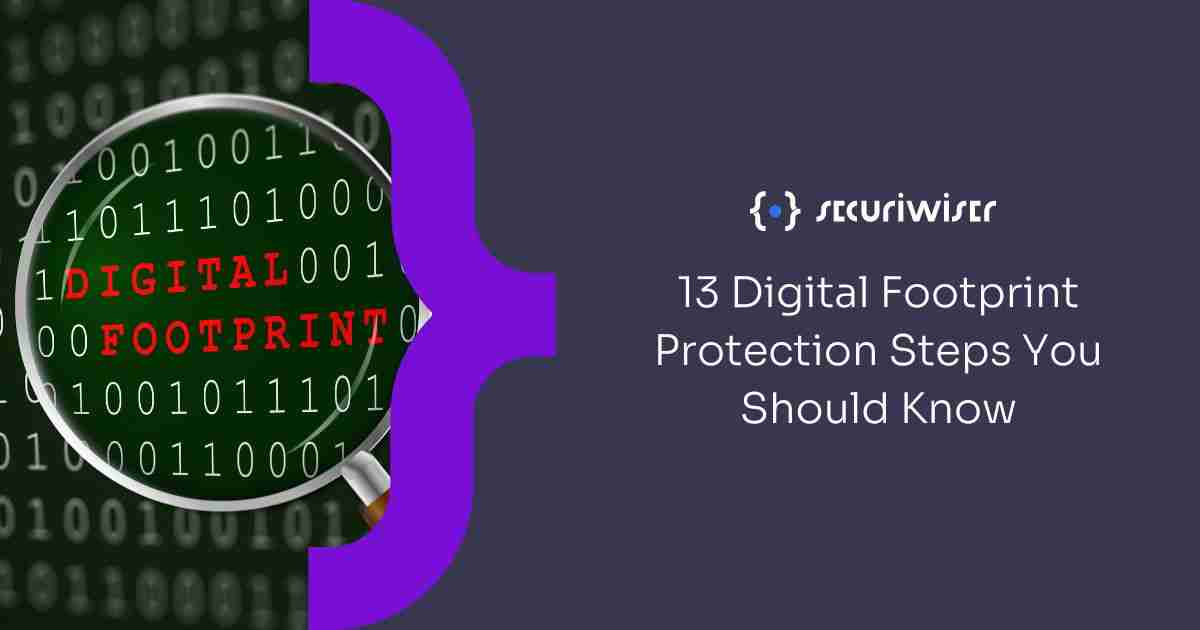13 Digital Footprint Protection Steps You Should Know
Blog / 13 Digital Footprint Protection Steps You Should Know
5 MIN READ


A digital footprint, also referred to as a digital shadow or an electronic footprint is the data trail left by users when they browse the Internet. The trail consists of visited websites, sent emails and information submitted online. A digital footprint can be used to track an individual’s online activities and devices and furthermore, these footprints can be created either actively or passively.
Further elaborated…
Your digital footprint grows in numerous ways for example, posting on social media sites, subscribing to news letters and visiting e-commerce sites.
In some cases, internet users contribute to their digital footprints in unknown ways. Examples of such occasions include allowing cookies on your devices, apps or browsers which collect your data. Once you give an organisation permission to enable cookies, they can share your data or sell them to third parties. In addition to this, in the case of a data breach, your personal data can be leaked. In relation to digital footprints, the terms you may frequently come across are active digital footprints and passive digital footprints.
Active digital footprints
Active digital footprints involve the user intentionally sharing information about themselves such as sharing posting on social media sites or online forums. When a user logs into certain websites with their registered usernames and passwords or make posts, they actively contribute to their digital footprint. Other active contributions consist of subscribing to newsletters, completing online forms or accepting cookies.
Passive digital footprints
Passive digital footprints consist of gathered information about users who are unaware of this activity. Examples of this range from websites recording the number of times users visit their websites, the visitor’s location and their IP address. Other examples are social media sites and advertisers using your likes and comments to direct certain content to you.
Why are they important?
Digital footprints are important because:
- They are to a large extent permanent or semi-permanent. Posts made in public online forums cannot be taken down from the internet and the owner no control over it.
- They can determine a person’s digital reputation which is now regarded to be just as important as their offline reputation.
- Employers can check the digital footprints of those they are interested in hiring. They may check any social media posts made by potential employees.
- Social media posts made may be altered.
- Cybercriminals may track your digital footprint to extract key words that they can use for phishing purposes or for forging a fake identity.
For these reasons, many internet users are now more careful of how their data is managed and gathered by the websites they visit.
Tips for protecting your digital footprint
As employers, universities and others can track your digital footprint, it is important to be mindful of your interactions online.
- Checking your digital footprint
Reviewing the search results that appear when you enter your name will provide you with a sense what information is being circulated about you online. Setting up Google Alerts is a method you can adopt for keeping an eye on your online reputation.
- Contacting websites that overshare your information
For example, real estate websites may contain more information about you than you are comfortable with. This information may consist of phone numbers, your email address and age. These websites can be contacted with the wish to remove these details from their site.
- Being careful of how much information is shared
Every time you share your personal details with an organisation, you expand your digital footprint. In the case that the organisation you shared your information with suffers from a data breach, your data will become vulnerable to cyber criminals and others. Therefore, prior to sharing any personal information, search whether you can receive that service without needing to provide your data.
- Reviewing privacy settings
Double check your privacy settings for the social media sites you have an account with and make sure that they are fitted with the settings you are comfortable with. For example, Twitter enables their users to limit who sees their tweets.
- Being careful of what you share
Social media can make oversharing information easy and therefore, it is important to be careful of what you post. Avoid sharing your number and email address on any sites and avoid clicking ‘like’ for your bank, health care provider and other organisations you are in regular contact with as this can give cyber criminals an idea on where your important accounts can be located.
- Only visiting secure websites
This includes websites that load with a padlock to the left of the address bar. The URL should begin with HTTPS also.
- Not sharing personal information over public Wi-Fi
As public Wi-Fi are less secure than private providers, personal information should not be shared when using public Wi-Fi.
- Deleting old accounts
Deleting accounts which you find yourself no longer using is one way for minimalizing the likelihood of your data being exploited.
- Using strong passwords
Using strong passwords can help keep your identity secure online. Passwords that are long and formed with a combination of uppercase letters, symbols and numbers are stronger and harder to crack. Using a password manager can also be beneficial as you can use one secure online account to help generate, store and manage all your strong passwords.
- Not using Facebook to login
It may be more convenient however, when you sign in to third party sites using your Facebook credentials, you provide that company permission to gather your Facebook user data.
- Making sure that your software is regularly patched
A result of not making sure that your software is up to date is the increased ease of cyber criminals exploiting underlying vulnerabilities to gain access to your device.
- Checking your mobile use
Many mobile apps share how their user’s information is gathered and used. Information that some apps gather include email addresses, location and other online activity. It is important therefore, to be aware of how certain apps may process user information prior to downloading them.
- Using a VPN
Using a VPN (Virtual Private Network) increases the security of your digital footprint. This is because VPNs enable your online actions to be hidden and untraceable in addition to preventing websites from installing cookies.
About Securiwiser
We aim to provide our clients advice concerning implementation of various specific cyber security methods, some of which will be more suitable than others depending on the business type to help ensure the cyber health of our client’s system.
We advise our clients (whether they are individual users or business owners) regarding various cyber threats that their businesses and operating systems may face. This includes increasing trends of certain threats and prevention methods that are cost effective and time saving.
Furthermore, business owners, employees and general users may forget to conduct regular scans to monitor the health of their operating system, which criminals can take advantage of to gain unauthorised access by exploiting unrecognised, underlying vulnerabilities.
Securiwiser can conduct regular scans for your system and provide a detailed cybersecurity risk assessment and a cybersecurity vulnerability assessment. We can further explain detected vulnerabilities and risks in detail to our clients and provide the best course of action that will save your business time and money.
Previous Article
What Is an Impersonation Attack?Next Article
How Insider Threats Put Businesses at RiskHow secure is
your business?
Blog categories
How secure is
your business?